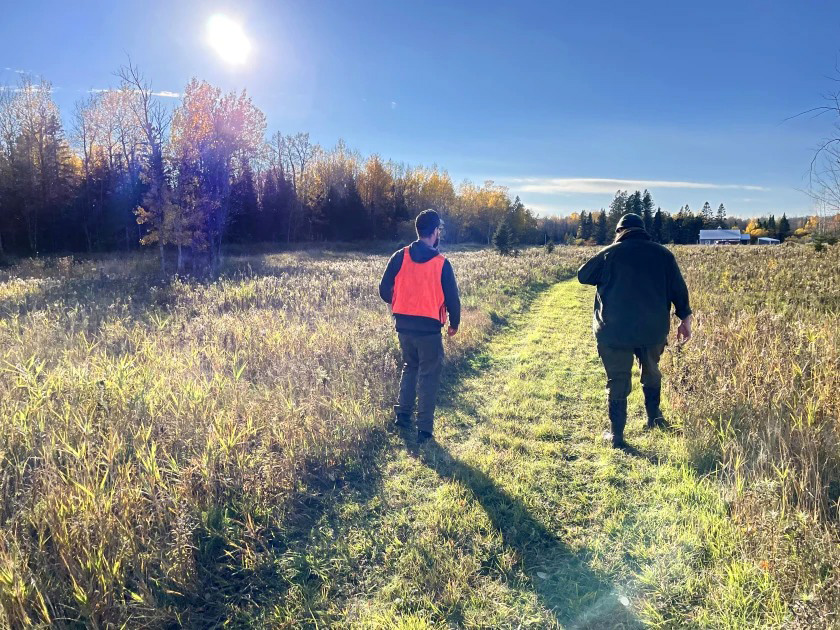Rebeka Ndosi’s plan for a BIPOC-led, nature-based retreat on Minnesota’s North Shore is one step closer to fruition.
On April 15, the Lake County Board of Commissioners approved Ndosi and her husband Matthew Myrold’s bid for a conditional-use permit, advancing the development of Maji ya Chai Land Sanctuary near Two Harbors.
The retreat center will offer nature-immersive programming to support healing from trauma and stress with offerings such as sound baths, yoga, movement, herbalism and more, said Ndosi, who has been a holistic health practitioner for 20 years.
On the couple’s 40 acres near the Encampment River, with a farmhouse, garage and pasture, Ndosi envisions a healing and practice center, a larger space for movement, yoga, a mobile barrel sauna and a hot tub.
Rebeka Ndosi and her husband, Matthew Myrold, are behind Maji ya Chai Land Sanctuary in Silver Creek Township outside Two Harbors, Minn. On April 15, 2024, the Lake County Board of Commissioners approved the couple’s bid for a conditional use permit, advancing the development of BIPOC-led, nature-based retreat on the couple’s 40 acres near the Encampment River along the North Shore of Lake Superior. (Courtesy of Matthew Myrold)
With the conditional-use permit approval, Ndosi and her team can focus on designing and building the retreat’s main lodging quarters, tree-clearing, yurt-raising and well-drilling.
In Minnesota, there’s a tradition of the family lake cabin. “We’re hoping Maji ya Chai can be that for families of color,” she said.
Born and raised a Tanzanian-American in Minnesota, Ndosi recalled having her “feet in two worlds” with her East African culture at home and feeling “not Black enough” among her peers.
She said her experience informs her plan for a welcoming, safe, BIPOC-focused-yet-not-exclusionary space.
Guests can come and know, “I can be with people who want me here, and I can relax enough to benefit from the beauty of this place,” she said.
It’s a much-needed space, especially for BIPOC people, said Maria Isley. The Duluth resident grew up in Two Harbors, where she learned firsthand the “profound” physical and emotional benefits of the natural surroundings.
Isley recently submitted a letter supporting Maji ya Chai (pronounced “MAH-gee yah Chai”) to the Lake County Board: “Growing up, I would often joke that my brothers and I made up half the minority population in the area. Thus, I am acutely aware of the importance of spaces like Maji ya Land Sanctuary.”
Isley told the Duluth News Tribune that there are “very few spaces that are specific and dedicated for people of color to have on their own.”
Debbie Cooter, of Silver Creek Township, said listening to personal experiences shared in support of the land sanctuary has stuck with her.
“Someone said, ‘You don’t quite know what it’s like to not feel safe, to be in the country and not feel safe,’” Cooter said.
Rebeka Ndosi is joined by folks during a hike near the Maji ya Chai Land Sanctuary outside Two Harbors, Minn. (Courtesy of Rebeka Ndosi)
Lake County needs more diversity, said resident Kirsten Cruikshank.
“Most entities are trying to embrace diversity and they’re wondering how to do it, so why wouldn’t we be embracing this,” she said.
Raising her kids on 56 acres, resident Lisa Knight said she understands what Ndosi is trying to build.
“All the things they’re talking about — wanting to have quiet space, dark skies, time in the woods — are the things we all want and that’s why we live here,” Knight said.
While there’s more support than opposition, Ndosi said, their efforts to build the retreat have unearthed resistance that spans from passive and unspoken to “threatening.”
Signs opposing Maji ya Chai were posted nearby, along County Road 3 and Clark Road, and the couple has had people trespass on their property, among other things.
Those who fear noise, density or light pollution from Maji ya Chai guests don’t understand they’re not coming for a party, “They’re coming for birdsong,” Cooter said.
The name “Maji ya Chai” comes from the Ndosi family’s Tanzanian village of origin, and she said she aims to honor her ancestors through efforts and to build connections from the land up north and the village way down south.
Also, the relationship-building and BIPOC education she hopes to cultivate is well in motion.
“We’re already in our mission,” Ndosi said, and she’s excited for the “lore that is to come, for the stories of future generations.”
To learn more, go to majiyachai.org.
Related Articles
St. Paul’s park system marks 175 years with gathering, a book, fundraisers
See photos and video of Minnesota’s stunning northern lights show
Lindy becomes first big fishing tackle company to make lead-free pledge
Strong solar storm could mean northern lights in Minnesota
Minnesota’s shadiest business grows and sells millions of trees every year


Leave a Reply